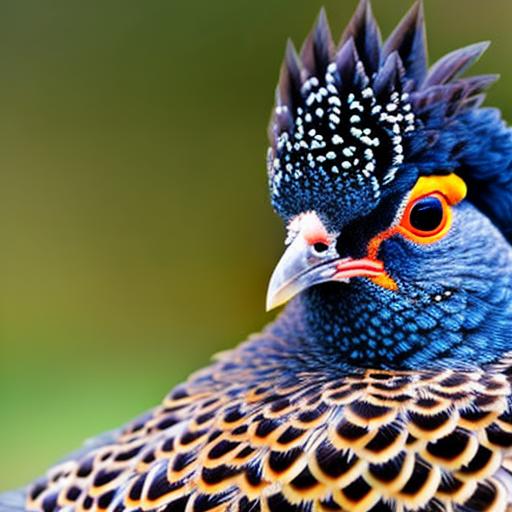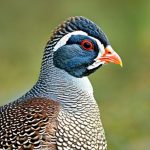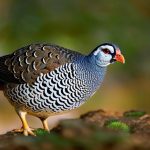Guinea fowl, also known as pintades, are domesticated birds that are native to the African continent. They are closely related to other game birds such as pheasants and turkeys. Guinea fowl are known for their distinctive appearance, with speckled feathers and a helmet-like bony structure on their heads. They are popular for their ability to control pests such as ticks, flies, and other insects, making them a valuable addition to farms and homesteads. Guinea fowl are also prized for their flavorful meat and eggs, making them a versatile and valuable bird for small-scale poultry production.
Guinea fowl are hardy birds that are well-suited to a variety of climates, making them an excellent choice for small-scale poultry production. They are also known for their loud and distinctive calls, which can serve as a natural alarm system to alert farmers to potential threats. Guinea fowl are social birds that thrive in small flocks, making them an ideal choice for farmers looking to add a unique and beneficial bird to their operations. With their striking appearance and valuable pest control abilities, guinea fowl are a popular choice for farmers and homesteaders looking to diversify their poultry flocks.
Key Takeaways
- Guinea fowl are hardy, low-maintenance birds that are known for their pest control abilities and flavorful meat.
- When housing guinea fowl, provide at least 3-4 square feet of space per bird and a secure coop to protect them from predators.
- Guinea fowl require a balanced diet of commercial poultry feed, supplemented with insects, seeds, and greens for optimal health and nutrition.
- Common health issues in guinea fowl include respiratory infections and parasites, so regular monitoring and preventative measures are important.
- Breeding guinea fowl involves providing a suitable nesting area and allowing natural mating behavior to occur, with hens typically laying eggs in the spring and summer.
Housing and Space Requirements
When it comes to housing guinea fowl, it’s important to provide them with a secure and spacious environment that allows for natural behaviors such as foraging and roosting. A well-ventilated coop or shelter is essential to protect guinea fowl from predators and the elements. The coop should also have roosting bars or platforms for the guinea fowl to perch on at night. Additionally, providing nesting boxes filled with straw or shavings will encourage hens to lay eggs in a safe and comfortable environment.
In terms of space requirements, guinea fowl need ample room to roam and forage. A minimum of 3-4 square feet per bird in the coop is recommended, with access to a larger outdoor area during the day. Fencing is essential to keep guinea fowl contained and protected from predators, as they are known to be excellent flyers and can easily escape if not properly contained. Providing a secure outdoor area with plenty of space for the birds to roam and forage will help keep them healthy and happy.
Feeding and Nutrition
Guinea fowl are omnivorous birds that have a varied diet consisting of seeds, grains, insects, and small vertebrates. In a domestic setting, guinea fowl can be fed a commercial poultry feed that is specifically formulated for game birds. This feed should contain a balance of protein, vitamins, and minerals to support the health and productivity of the birds. Additionally, providing access to grit or small stones will help guinea fowl properly digest their food.
In addition to commercial feed, guinea fowl can also benefit from access to pasture and forage. Allowing guinea fowl to roam in a grassy area will provide them with opportunities to hunt for insects and other small prey, which is an important part of their natural diet. Supplementing their diet with fresh fruits and vegetables can also provide additional nutrients and variety. It’s important to provide fresh, clean water at all times to ensure the health and well-being of the birds.
Health and Wellness
Maintaining the health and wellness of guinea fowl is essential for their productivity and longevity. Regular health checks and observation can help identify any potential issues early on. Common health concerns for guinea fowl include respiratory infections, parasites, and injuries from predators or aggressive behavior within the flock. Providing a clean and well-ventilated living environment, along with regular access to fresh water and a balanced diet, can help prevent many health issues.
In addition to preventative measures, it’s important to have a plan in place for addressing any health concerns that may arise. Establishing a relationship with a poultry veterinarian who is familiar with guinea fowl can be invaluable in providing proper care and treatment when needed. It’s also important to quarantine any new birds before introducing them to an existing flock to prevent the spread of disease. By prioritizing the health and wellness of guinea fowl, farmers can ensure that their birds remain productive and thrive in their environment.
Breeding and Reproduction
Breeding guinea fowl can be a rewarding endeavor for farmers looking to expand their flock or raise birds for meat or egg production. Guinea fowl are seasonal breeders, typically mating in the spring and early summer months. To encourage successful breeding, it’s important to provide a comfortable and secure nesting area for hens to lay their eggs. This can be accomplished by providing nesting boxes filled with straw or shavings in a quiet and secluded area of the coop.
Once eggs are laid, they can be collected and placed in an incubator or left with the hen to hatch naturally. Incubating guinea fowl eggs typically takes around 26-28 days, after which the chicks will hatch. It’s important to provide a warm and safe environment for the chicks to grow and develop, as they are vulnerable to predators and the elements in their early days. By carefully managing the breeding and reproduction of guinea fowl, farmers can ensure the continued growth and success of their flock.
Predation and Protection

Guinea fowl are vulnerable to predation from a variety of animals, including foxes, raccoons, hawks, and domestic dogs. To protect guinea fowl from predators, it’s important to provide a secure living environment with strong fencing and predator-proof coop or shelter. Additionally, providing roosting bars or platforms within the coop will allow guinea fowl to sleep safely off the ground at night.
In addition to physical protection measures, it’s important to consider the use of guard animals such as dogs or llamas to help deter potential predators. These animals can serve as an additional line of defense against predators and help keep guinea fowl safe from harm. By implementing a combination of physical barriers and guard animals, farmers can help protect their guinea fowl from predation and ensure their safety and well-being.
Benefits of Keeping Guinea Fowl
There are numerous benefits to keeping guinea fowl on a farm or homestead. One of the primary benefits is their ability to control pests such as ticks, flies, and other insects. Guinea fowl are voracious hunters that will actively seek out and consume pests in their environment, making them an effective natural pest control solution for farmers. Additionally, guinea fowl are valued for their flavorful meat and eggs, making them a valuable addition to small-scale poultry production operations.
In addition to their practical benefits, guinea fowl are also valued for their unique appearance and vocalizations. Their striking speckled feathers and distinctive calls make them an interesting and attractive addition to any farm or homestead. Furthermore, guinea fowl are hardy birds that are well-suited to a variety of climates, making them a versatile choice for farmers looking to diversify their poultry flocks. Overall, keeping guinea fowl can provide numerous practical benefits while also adding interest and diversity to a farm or homestead setting.
Looking to keep your guinea fowl happy and healthy? Check out this informative article on PoultryWizard.com that offers valuable tips on creating the perfect coop for your guinea fowl. Whether you’re looking for advice on building a spacious coop, creating a farmhouse-style setup, or designing a secure run, this article has got you covered. Learn more about creating the ideal coop for your guinea fowl here!
FAQs
What are guinea fowl?
Guinea fowl are a type of bird that are native to Africa. They are known for their distinctive spotted feathers and loud, chattering calls.
What do guinea fowl eat?
Guinea fowl are omnivores and eat a variety of foods including insects, seeds, and small fruits. They are also known to forage for food on the ground.
What are the benefits of keeping guinea fowl?
Guinea fowl are often kept for pest control, as they eat insects and can help to reduce the population of ticks, flies, and other pests in an area. They are also valued for their meat, which is lean and flavorful.
How do you care for guinea fowl?
Guinea fowl require a secure coop or shelter to protect them from predators, as well as access to a large outdoor area for foraging. They also need access to fresh water and a balanced diet to stay healthy.
Are guinea fowl noisy?
Yes, guinea fowl are known for their loud calls and can be quite noisy, especially when they feel threatened or are trying to communicate with each other.
Meet Walter, the feathered-friend fanatic of Florida! Nestled in the sunshine state, Walter struts through life with his feathered companions, clucking his way to happiness. With a coop that’s fancier than a five-star hotel, he’s the Don Juan of the chicken world. When he’s not teaching his hens to do the cha-cha, you’ll find him in a heated debate with his prized rooster, Sir Clucks-a-Lot. Walter’s poultry passion is no yolk; he’s the sunny-side-up guy you never knew you needed in your flock of friends!







